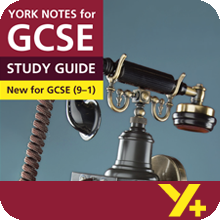Examiner's Notes
You assessed this answer as Grade 3.
Hover over the highlighted text to read the examiner’s comments.
‘Mr Birling: And a police inspector is on his way here – to ask some – questions – As they stare guiltily and dumbfounded, the curtain falls.’
Explore how time is important in the play.
You must refer to the context of the play in your answer.
Priestley was interested in the idea of time, and wrote several plays, such as ‘Dangerous Corner’ (1932), that included the theme of time. In ‘An Inspector Calls’ he explores the idea that time could repeat itself so that events happen again. He uses this idea to create drama through twists and shocks.
The timing of the play is also important. It is set in 1912, two years before the First World War, but it was first shown in London in 1946 after the Second World War, which the audience would have lived through. Some would have lived through both world wars, like Priestley. Early in Act I, Mr Birling does not know what is to come, and his judgement is not very good. He thinks that the future is just fine, with ‘increasing prosperity’ ahead. Eric is less certain, but his father dismisses him. This is a tragedy when you consider that Eric (and Gerald) would be the right age to fight in the First World War, when millions died, something Priestley would have known about.
Although the play takes place over a single evening, so real time, Inspector Goole seems to exist outside real time. He appears uninvited at the wealthy Birlings’ house out of the blue. They have never heard of him but the Inspector’s ‘massiveness, solidity and purposefulness’ take over. He describes the way in which each of the Birlings and Gerald are involved in Eva Smith’s suicide. The Inspector is Priestley’s mouthpiece. This means he speaks about the need for a fair society with a strong sense of community.
We never meet Eva Smith, and Inspector Goole is the only one who knows what happens to her. He controls when the characters see Eva Smith’s photo, so no two characters see the photograph at the same time. Perhaps they do not even see the same photo. We discover in Act I that he also found Eva Smith’s diary in her room, which gives her timeline, and when she is involved with the Birlings and Gerald. All the characters take for granted that she is a real person. But all they really know is that they behaved badly to someone like her, one of ‘the millions and millions of Eva Smiths’ – that is, someone who is poor and has no power.
Gerald returns at the end of Act III when Inspector Goole has left. He has been investigating and discovers that, ‘There isn’t any such inspector.’ This is confirmed by Mr Birling, who rings his friend Chief Constable Roberts. If there is no Inspector, then there can be no Eva Smith. This allows Mr and Mrs Birling and Gerald to sigh with relief, as if the events they have been through didn’t happen, like waking from a nightmare. Only Sheila and Eric are still upset. They do not feel that Inspector Goole’s comments about each character’s cruelty can be forgotten so easily. Then the phone rings and we have the second twist of the play. Arthur Birling picks up the phone and he declares ‘… a police inspector is on his way here – to ask some – questions’. At this point the play ends, as events are about to happen again.
The ending of the play leaves us with a lot of questions about the theme of time. What has just happened throughout the play is going to happen again. The Inspector has given the characters a second chance to change the way they will treat people like Eva Smith. Priestley, because he experienced two world wars, wants the audience to think about how to avoid another war and to consider the kind of future we want. He would like one in which we care for each other.
